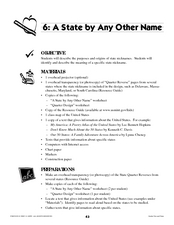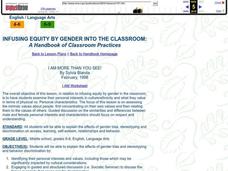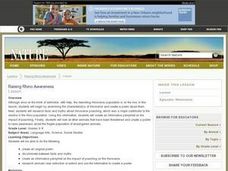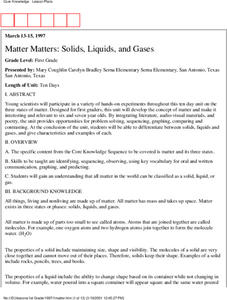Curated OER
Early Civilizations of Ancient India
Taking your class through one of the richest and most influencial histories on earth, these slides detail the development and characteristics of Indian culture. Full of pictures of ancient relics, maps of migration and settlement...
Curated OER
A State By Any Other Name
Learning about the fifty states can be motivating. After listening to books, pupils discuss and learn about the nicknames of various states. This is an interesting way to review the locations and characteristics of the states.
Curated OER
In Cell-A-Bration of Cells
Sixth graders identify major cell organelles found in both animal and plant cells. Pupils observe a PowerPoint presentation based upon the features of a haiku. They create haiku science-based poem which describe the characteristics of...
Curated OER
Poetry for Kids
Sixth graders be immersed indirect experiences which are opportunities for students to reflect, look back, debrief or abstract from their experiences what they have felt, and thought, and studied.
Scholastic
Ready to Research Owls
Researching facts about owls can be a hoot for your class. Let them wisely collaborate on this writing project. The resource is the second part of three parts. It is best to use all three lessons in order.
Curated OER
Bugs
This is not just a worksheet, but an entire set of activities and worksheets that can accompany any unit on bugs or insects. Little learners will hone early math and literacy skills as they create mini-books, discriminate between big and...
Loudoun County Public Schools
Figurative Language Packet
A definitive resource for your figurative language unit includes several worksheets and activities to reinforce writing skills. It addresses poetic elements such as simile and metaphor, personification, hyperbole, and idioms, and...
Curated OER
Spiders
First graders complete a variety of center activities to study spider characteristics and facts. They solve math problems, identify spider body parts, and study vocabulary words to use in creative writing about spiders.
Curated OER
Emerging Heroes
Twelfth graders define what a hero is and watch a video. In this hero lesson plan, 12th graders discuss the characteristics of a hero and list heroes and their attributes. Students read the poem Beowulf and identify...
Curated OER
The Poetics of Hip Hop
Young scholars consider the role of rhythm, form, diction, and sound in poetry. In this integrated arts lesson, students discuss the attributes of poetry as they analyze Shakespearean sonnets, hip hop music lyrics, and poems by...
Curated OER
Somewhere Under the Rainbow--The Romantic Period in British Literature
Students create 2-3 poems, a children's story, or a two or three dimensional piece of art. In this Romantic Period lesson, students discuss the historical background of the Romantic Period and relevant literary terms. ...
Curated OER
- Making Metaphors with Munchies
Students brainstorm independently first, then ask their best friend on the team, or seat partners, depending on the year & student mix, to add to their list of personal characteristics and/or to name three words they think of...
Curated OER
Weather "Whys" Lesson 2 Seasons
Students explore seasons. In this cross curriculum weather and seasons lesson, students identify characteristics of the four seasons and sequence related pictures. Students listen to poems and stories about trees in different...
Curated OER
Changing Bodies
Seventh graders listen to a poem about how a teen feels not understanding what is happening inside his body. In this health instructional activity, 7th graders label the endocrine glands and put sex characteristic cards in the order...
Curated OER
Creative Voices of Harlem
Young scholars explore the Harlem Renaissance. For this American history lesson, students examine a poem by Langston Hughes and identify the characteristics of the Harlem Renaissance. Young scholars research and report on a famous Harlem...
Curated OER
A Native American Cultural Exchange
Fourth graders communicate with members of Native American tribes via email, exchange original poems with epals, and create multimedia presentations to share with classmates.
Curated OER
Adopt a Tree
First graders describe the characteristics of a tree. In this science lesson plan, 1st graders create predictions about a book they will be listening to, Have you Seen Trees. Additionally, students describe their trees using their 5...
Curated OER
Early Industrialization
Eighth graders analyze primary source documents emphasizing young people in factory labor (mill workers during 1840-1860). They study hours of labor, ages of laborers, reasons for working, and working conditions. They write a poem or song.
Curated OER
I Am More Than You See
Students discuss the effects of gender bias and stereotyping by identifying personal interests and values. In this sociology lesson, students iscuss the forces in society which cause gender discrimination, create poems about themselves,...
Curated OER
Raising Rhino Awareness
Young scholars create a poster that promotes awareness about endangered animals. In this biology lesson, students explain the impact of rhinoceros poaching. They create a poem about them and present it in class.
Curated OER
Trot Out the Creativity with Turkey-Themed Art Activities
Take the traditional handprint turkey to the next level with art activities that integrate writing, color, poetry, and family involvement
Curated OER
Transportation
Students identify and name at least six different kinds of transportion, sort and classify different kinds of transport according to similar and/or different characteristics and identify the purpose of different types of transportion.
Curated OER
Matter Matters: Solids, Liquids and Gases
Scientists participate in a variety of hands-on experiments in this ten-day unit on the three states of matter. Lessons incorporate literature, a-v materials, and poetry to help students differentiate between solids, liquids and gases.
Curated OER
What is a Hero? Heroism in Greek Mythology
Students explore the tales of Greek mythology and discuss what it means to be a hero. They associate acts of epic heroism with philanthropy noting that these characters acted in a larger than life manner to secure the common good.

























